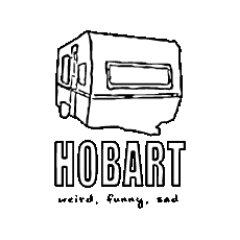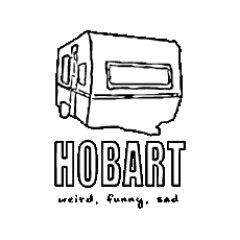1. Hobart's guidelines are succinct. They have been for a while, so I assume it's working. You even have this line, "More instructions would really only clutter this page, wouldn't it?" Yet, that's what most journals have. I'm curious if this leads to more poorly formatted submissions/cover letters/work outside your wheelhouse or if extensive submission guidelines might be overkill?
Personally, I don't really care about formatting or cover letters, so it isn't really possible for those to be "wrong." I think, more often than not, more specific guidelines end up being kinda cheesily "quirky," in ways that are sometimes borderline annoying and other times more confusing than anything, and even more straightforward guidelines feel limiting. I've tried to write versions of "this is what I'd love to see...," but then my favorite submissions are often the ones that surprise me. I think Hobart has the benefit of having been around so long at this point, most people have a decent idea of the kind of things we're looking for? I think there's lots of writers who have a better sense of what makes a "Hobart piece" than I do! And then we, of course, always get some that are outside our wheelhouse, but I think that happens no matter what.
2. My friend submitted to Hobart ten times before getting accepted. I think writers worry that editors remember them or might get annoyed by so many submissions. Is there any validity to this concern, or is it good ol' writer paranoia?
It's writer paranoia. I LOVE when we accept a writer who keeps trying and trying!
3. How has your experience as an editor shaped your journey as a writer?
Honestly, the two are so intertwined, I don't even know how to separate them. My current writing often influences my reading tastes — although sometimes in ways that I am drawn to the kinds of things I'm most fascinated with in my own writing and other times to the very kinds of writing I'm not doing or not even capable of — and vice versa. Between the two and then also teaching, it's all kinda just a big braiding together of various aspects of my life that are all words.
4. Hobart is over twenty years old now, that's twenty years of editing, and you went on to create HAD. Clearly, something about the editorial process keeps you going. I'm sure there are many, but what are a couple times along the way where you've had things happen and felt: this is why love doing this! (I could, of course, be completely wrong, and you've just been held hostage for two decades, in which case, blink twice).
*blinks once... pauses, unsure if a joke and to leave it at that or if I should blink again*
I really do love it, although discerning exactly how or why is hard. I love sending acceptances and getting an excited reply back. I love accepting work from new writers and sometimes getting to be their first publication, and I love accepting a 4th or 10th or 15th piece by a writer I've built something of an editor/writer relationship with, and I love getting to accept and publish and work with a writer who is among my favorite living writers, and I love accepting a piece from a writer who I or we have rejected a bunch of times, but they kept trying and trying (see: the second question and answer.).
We had two stories ("North Country" by Roxane Gay and "Navigators" by Mike Meginnis) from one of our print issues, Hobart 12, appear in that year's Best American Short Stories, and while that was a huge deal for us, obviously, it was so, so awesome how exciting it was for them.
There are a few writers — Claire Vaye Watkins and J. Ryan Stradal jump to mind, but I know there's lots of others, too — whose first publication was Hobart and who have since gone on to publish amazing, brilliant books, and it has been awesome to read and love those books and also awesome to see them get so much attention.
I could keep going with stories and examples, but I'll end with saying: I'm not always a hands-on editor, lots of stuff comes in ready-to-publish, but I feel like semi-regularly there's a piece I love, and I think I have a good idea or two to help take it from very good to great and sometimes those edit suggestions come back with excitement from the author about how the edits unlocked the piece for them or answered one of their frustrations or just surprised them with something about their own piece, and that is never not an amazing feeling, helping a writer figure out how to make their piece "better," even just a little bit, and see them get even more excited about their own work.
5. Our goal is to help people have less anxiety over the submissions process, and one thing writers (especially new ones) often struggle with is writing a bio to go with their story. With that in mind, if, say, your favorite cartoon character had a story accepted to Hobart, what might an ideal 3rd person bio for them look like?
Honestly, my biggest note is that stuff like that doesn't really matter. I know newer writers can stress about it, in part because it feels like a just-right bio or cover letter is going to become the key to unlocking an acceptance or is going to be the reason why they might get rejected, but that just isn't the case. Just be simple, straightforward. Mention a couple pubs, if you have any. If you don't, mention that this is/would be your first publication. As noted above, most editors and journals would love to see that! If you're a student, either MFA or undergrad, feel free to mention that, but also, you don't have to. And if you aren't, don't worry about not being; it doesn't matter. Mostly just keep it simple and don't worry or think that much about it. Spend your time and energy on the writing itself.
6. We like to add a magazine's vibe to their profile pages. If you could sum up Hobart's vibe in six words or less, what would they be?
Great writing; doesn't take itself seriously.
7. There are well-worn (for good reason) pieces of advice like "read submissions guidelines" and "read the journal you're submitting to," but do you have any other advice for prospective writers looking to get their work published?
Not really. Ha. Sorry! Read a bunch. Write a bunch. Repeat. If you have time, volunteer to read for a journal. Seeing behind the scenes can be really helpful in demystifying it all, and it can also be really helpful to read a bunch of stuff that gets passed on. Most of us only ever get to read all the stuff that gets published; reading the stuff that doesn't can be just as (more?) helpful.
8. If you could add one question to this interview, what would it be, and how would you answer it?
I don't know. These Qs were great! So great, I feel like I used up all my mental energy trying to answer them helpfully and thoughtfully (and maybe also at least a little entertainingly), and so nothing else really jumps to mind.
View Hobart on Chill Subs

